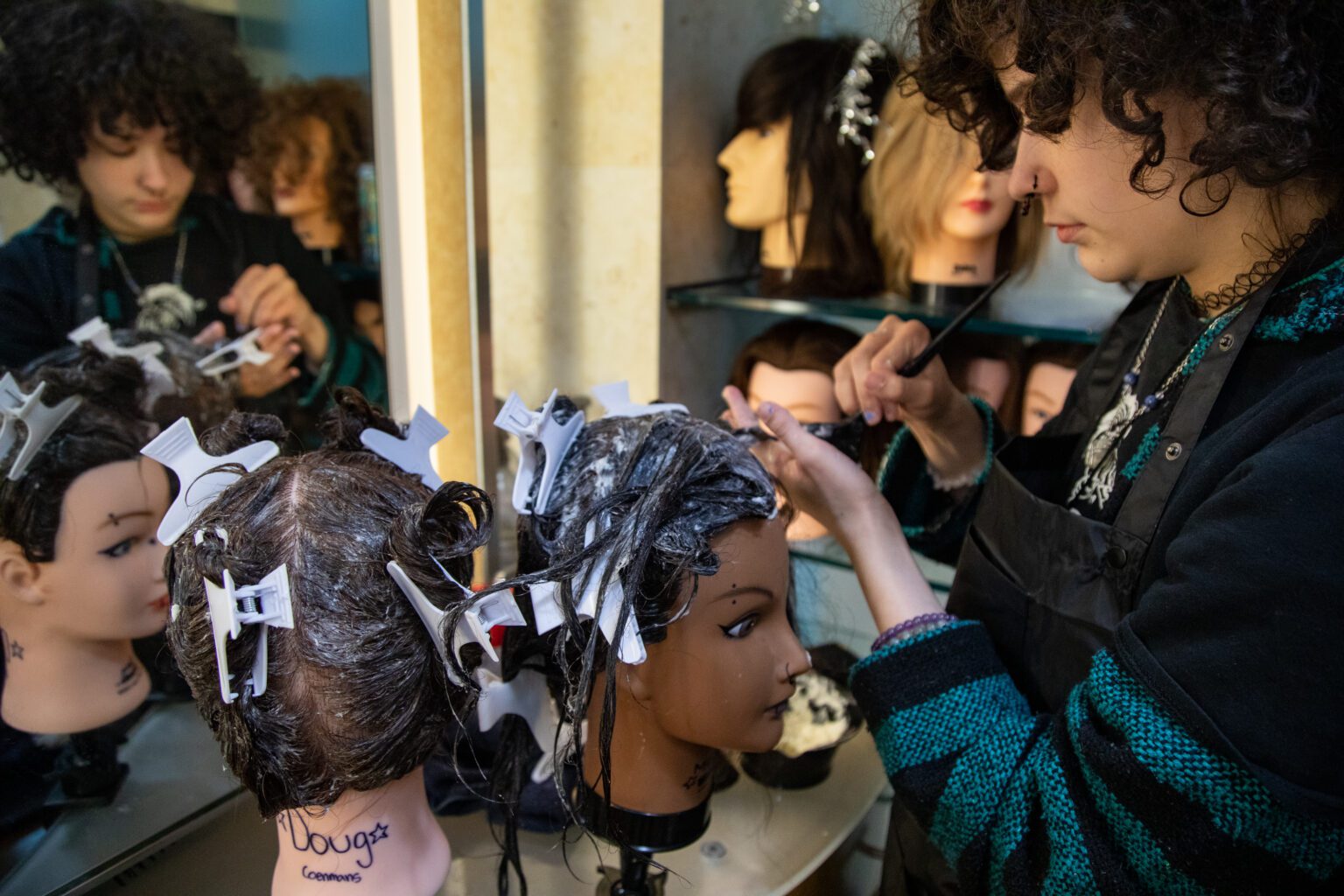From behind a curtain in the Bellis Fair Mall, local high school students laugh and chat as they practice styling one another’s hair or applying makeup to the dead-stare of their training mannequin heads.
Twice a week, 50 students from Bellingham, Sehome and Squalicum high schools cycle through a once-abandoned salon in the mall to take a career and technical education (CTE) class in cosmetology.
“I like how hands-on it is. I learn better, not when I’m listening to someone describe,” Squalicum senior Alex Krause said while practicing applying conditioner to the roots of her mannequin’s hair with a brush to prepare for dyeing.

Throughout the school year, the juniors and seniors learn everything from the practical skills of styling, dyeing and cutting hair, and doing makeup, while also learning about business ethics, customer service, and safety to prepare them to enter the workforce.
Teacher Liesl Vial leads the students each week. For the last decade, she’s worked as a special education teacher with the district, but prior to that, she was a licensed cosmetologist. Her career allowed her to go back to school to become a teacher, and she said her new role is the perfect marriage of her two career paths.
“I really like the energy of the class, and I like to be able to support [students] and answer all the questions they have about hair color and the beauty industry,” Vial said.
As the first semester draws to a close, Vial and paraeducator Krista Cameron have already covered topics of hair styling, the history of hair and applying makeup. She said they also go over the foundations of a business and being in a workplace environment with managers and customers. Next up in the curriculum is bleaching and dyeing hair.
While students do not receive certifications, Vial said some local beauty schools and salons offering apprenticeships will allow students to apply credit hours from the CTE course toward full accreditation.

CTE Director Jeff Tetrick said the school district has strong relationships with Whatcom Community College and Bellingham Technical College, and they are working to increase pipelines for students into professional technical programs by adding more courses and dual-credit opportunities.
Currently, more than 2,500 students district-wide are taking at least one of the 67 CTE classes offered at the four high schools. The district offers culinary, aerospace engineering, American Sign Language, sports medicine and more courses. Construction Academy was also a new addition this school year. Tetrick said when creating a new class, he and the CTE General Advisory Council look at industry demands and students’ requests.
The cosmetology program was heavily requested and the class filled up quickly. They set to work to find a space to hold the class and locked down the abandoned Regis salon at the mall for $650 a month. When the previous owners closed the shop, they left a plethora of hair dyeing products, salon chairs and more. The district earmarked $14,000 to cover the launch of the program, including other needed materials and curriculum. Tetrick said the district has received additional support from the Evergreen Beauty College and Zorganics Institute of Beauty and Wellness.
For the 2022-23 school year, the district budgeted approximately $7.1 million in revenue and expenditures for CTE programs. The Bellingham community also helps fund the technology used in many CTE programs through the technology levy passed in 2020. In Washington state, schools get additional funding for each CTE program to offset a large portion of the costs for school districts.
One of the biggest roadblocks, Tetrick said, is finding physical space to hold CTE classes with specialized equipment and other limitations. But he said the district is supportive of the growth of the programs and has worked to include designs for new spaces in capital bonds.
“It’s not being forgotten about — it’s being celebrated,” Tetrick said.
In 2018, the school district implemented an eight-credit schedule to allow students more opportunities for electives, like CTE courses. In 2017, just 173 students received industry certificates, and two years later, the count jumped to 1,005.

Tetrick said one of the benefits of the CTE program is that it removes barriers for students entering the trades because they provide free classes and cover the cost of materials.
However, even if students decide not to enter the trade they take a class in, they’re still learning valuable life skills, like cooking, using tools and managing finances. Squalicum senior Keesha Vinnie has been dyeing her own hair since she was 14 and said she is excited to expand upon those skills more professionally.
“I don’t plan to go professional with it, but just knowing how to get those skills will definitely carry over,” Vinnie said.
This story was updated to correct the name of a program sponsor, Zorganics Institute of Beauty and Wellness.



